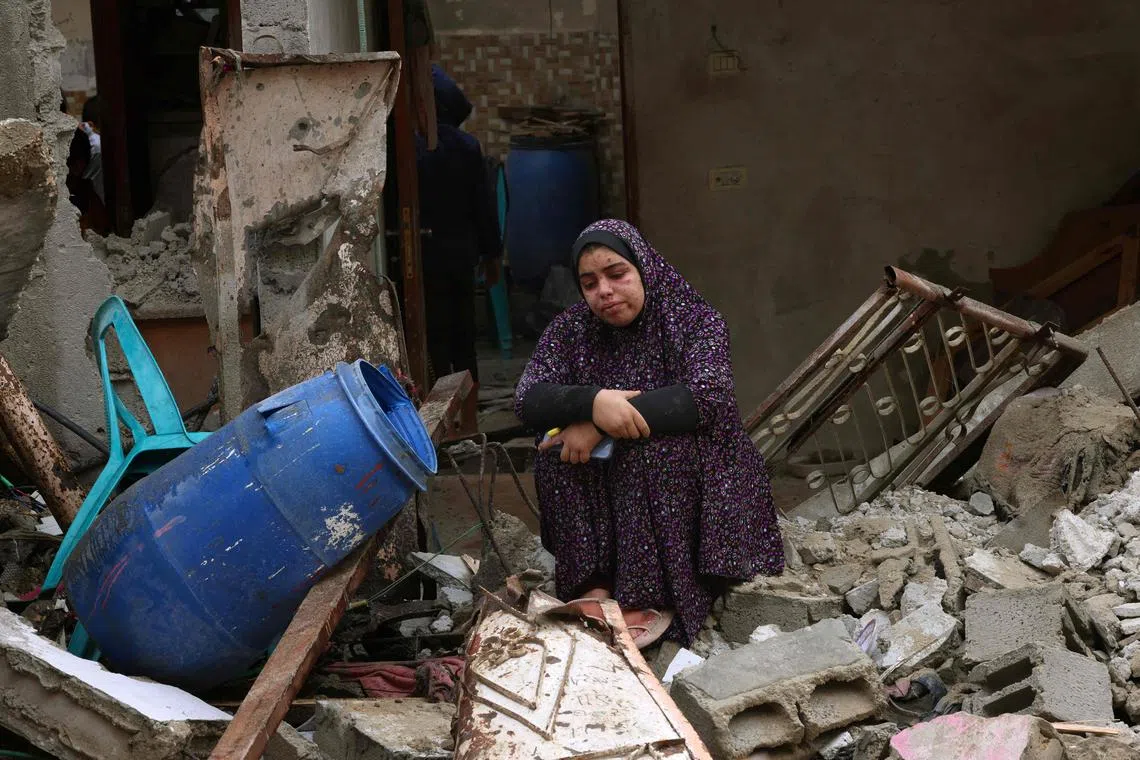US frustration with Israel grows as Gaza civilian deaths mount
Sign up now: Get ST's newsletters delivered to your inbox

The civilian death toll in the Gaza Strip has risen to more than 11,000 people.
PHOTO: AFP
Follow topic:
WASHINGTON – The White House is getting increasingly frustrated with Israel’s conduct of the war against Hamas as the civilian death toll mounts and the administration’s calls go unheeded, widening a rift between the close allies.
Administration officials are having what they describe as more difficult conversations with their Israeli counterparts.
The United States is trying to shape the conflict – only to have Israel ignore it, according to several people familiar with the conversations. They asked not to be identified discussing private deliberations.
They said the administration has ramped up its private messaging to Israel as impatience has grown.
At the same time, the administration is still fulfilling Israel’s weapons requests,
The tense conversations highlight the risks of the strategy adopted by US President Joe Biden’s administration. It has rested in large part on the idea that a close public embrace of Israeli Prime Minister Benjamin Netanyahu would open space behind the scenes to deliver tough messages and shape Israel’s conduct of the war.
But that has proven a difficult balance.
Israel has stepped up its campaign against Hamas and the civilian death toll in the Gaza Strip has risen to more than 11,000 people,
The Biden administration has also come under growing pressure from Arab allies, who argue that its embrace has given Mr Netanyahu a green light to proceed.
At the same time, Mr Netanyahu has so far swept aside US concerns about Americans who remain hostage in Gaza and the hundreds of Palestinian-Americans who have not been able to leave the territory, people familiar with the matter said.
“If your action plan is basically ‘there were 30,000 Hamas fighters, we’re going to kill them all and yes, there will be blood and damage, we’re sorry for that’ – that’s worrisome,” said Mr Brian Katulis, vice-president of policy at the Middle East Institute in Washington. “That produces a humanitarian crisis inside of Gaza, that produces threats to the US citizens who still haven’t got out, and it probably escalates tension across the region.”
Al-Shifa Hospital
Some of the strain has centred on Israel’s campaign on Al-Shifa Hospital in Gaza, which US and Israeli officials agree hides a major Hamas headquarters.
Although the Biden administration concurs that Israel needs to root out Hamas, the fear is that Israel is not doing enough to protect civilians trapped inside. On Monday, Mr Biden said Al-Shifa “must be protected”.
On Tuesday night, Israel appeared to defy that warning, with the military saying troops were “carrying out a precise and targeted operation against Hamas”
Another sore spot is the future of the Gaza Strip, and Mr Netanyahu’s shift from saying Israel does not want to occupy the area again to vowing that Israeli forces will remain there indefinitely
The officials said the US has been cautioning over and over that Israel needs to protect civilians.
When the US asked what happened when Israel hit a refugee camp, the Israeli response was almost dismissive, with its leaders saying their objective had been achieved, the officials said.
Israel’s response is tinged with impatience and accusations of hypocrisy.
Israeli officials insist the US continues not to understand the trauma coming out of the Hamas attack on Israel on Oct 7
Israeli officials declined to comment on the conversations.
But they have acknowledged that they can keep up the campaign for only so long.
Foreign Minister Eli Cohen said in a briefing with reporters on Monday that its international legitimacy will last another two to three weeks. “We sense there is international pressure on Israel. It is not strong, but it is getting stronger.”
Now, the US has started to make its private anger with Israel more public. Last week, US Secretary of State Antony Blinken said “far too many Palestinians have been killed”.
And National Security Adviser Jake Sullivan said Hamas terrorists’ use of civilians as shields does not lessen Israel’s “responsibility to act in ways that separate terrorists from civilians”.
Mr Biden has let some of his frustrations show too. On Monday, he told reporters he had “not been reluctant expressing my concerns” around fighting at Gaza hospitals.
On Nov 9, he said the effort to implement humanitarian pauses in the fighting had “taken a little longer than I hoped”.
Part of the growing US impatience is driven by pressure from other partners, especially in the Arab world.
Some leaders believe that Mr Biden’s embrace of Mr Netanyahu – and his meeting with the war Cabinet – on his visit to Israel in October
“There’s just tremendous frustration with the United States and what many see as a lack of credibility for the Biden administration,” said Ms Karen Young, a senior researcher at Columbia University’s Centre on Global Energy Policy. “It’s going to take a long time to restore a sense of trust.”
Amid the concern, the US has pressed ahead with financial and military support for Israel, including by providing some of the weapons that Israel has used in its bombing campaign. That includes 155mm artillery shells that have drawn protests from aid groups for their poor accuracy.
“For the last 50 years, Israeli wars have ended because the United States stepped in and said, ‘It’s time to stop,’” said Mr Jon Alterman, a senior vice-president at the Centre for International and Strategic Studies.
“We’re certainly not at that point, but we’re closer to that point than we were when the President went to Jerusalem.” BLOOMBERG

